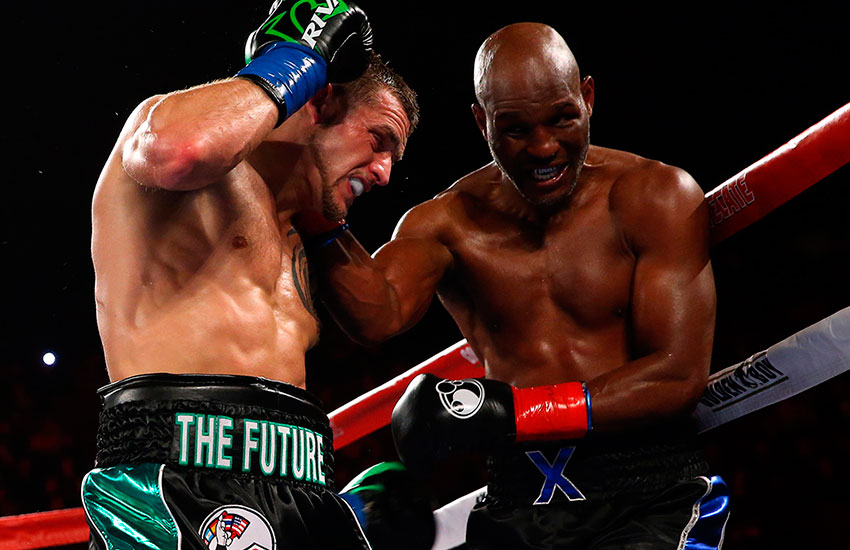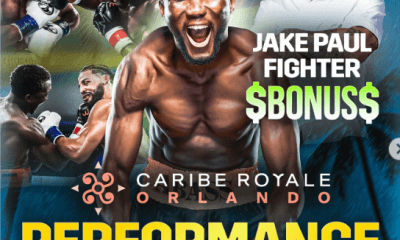Canada and USA
The Hauser Report: Bernard Hopkins, the Heavyweights, and More

THE HAUSER REPORT — HBO and Showtime rang down the curtain on their live 2016 boxing telecasts with a flurry of activity on December 10 and December 17 that said good-bye to the past and offered a glimpse of the future.
Let’s begin at the end. Bernard Hopkins fought Joe Smith on December 17 in a fight televised by HBO.
Hopkins (now 55-8-2, 32 KOs) will turn 52 years old next month and had pledged that, win or lose, this would be his last fight.
Smith was born on September 20, 1987, eleven months after Hopkins turned pro. Joe entered the ring with a 22-1 (16 KOs) record that had been cobbled together against mostly pedestrian opposition. The one bright spot on his ledger was a first-round upset victory over Andrzej Fonfara earlier this year.
Hopkins-Smith shaped up as a match between a very old, skilled veteran against a tough club fighter. Prior to the bout, Smith voluntarily entered a VADA testing program designed to detect the presence of performance-enhancing drugs. Hopkins declined to do so.
Last month, I spoke with Ron Katz (possibly the best matchmaker in the United States east of the Nevada-based Bruce Trampler) and asked Katz what he thought would happen in Hopkins-Smith.
“Joe will knock him out,” Katz said.
Of course, Katz is the matchmaker for Star Boxing (Smith’s promoter).
“Are you just saying that because Smith is your guy?” I pressed.
“You know me better than that,” Katz countered. “There have been times when I told you our guy had next-to-no chance. Hopkins is an old man, and he’s a lot older now than he was when he fought Kovalev [in November 2014]. Unless Joe freezes, he’ll walk through Bernard.”
HBO’s telecast was packaged as The Final Fight of The Legendary Bernard Hopkins.
Smith ruined the script.
In round one, it was clear that Hopkins isn’t close to being a great fighter anymore. Smith went after him from the opening bell and kept the pressure on throughout the fight.
Smith suffered a cut along his left eyebrow from a headbutt in round two that HBO blow-by-blow commentator Jim Lampley observed “wasn’t anything near accidental.” But as the fight progressed, Joe began landing to the body and hit Hopkins with increasingly clean punches up top that wouldn’t have landed on Bernard several years ago. Hopkins fought mostly to conserve energy and avoid punishment while attacking occasionally with right hands that carried less power than in years past. Also, Bernard began to tire.
Early in round eight, Smith cornered Hopkins and connected with a series of punches punctuated by a solid right hand and two hooks to the head that blasted Bernard through the ropes. Hopkins was unable to make it back into the ring within the twenty seconds allotted for such matters and was counted out at 53 seconds of the round. It was the first “KO by” loss of Bernard’s 65-bout career.
“He got frustrated,” Hopkins said after the fight. “And I might have gotten glazed [SIC] with a left hook and next thing I know he was throwing me out of the ring. I injured myself and hit my head first and hurt my ankle. I knew of the 20 seconds but couldn’t stand up on my feet because my ankle was injured. I could walk but I couldn’t box.”
At the time of the stoppage, Smith was ahead on two of the judges’ scorecards by margins of 69-64 and 67-66. The third judge (Pat Russell) had an inexplicable 67-66 score in Bernard’s favor.
According to CompuBox, Smith outlanded Hopkins in seven of the eight rounds en route to an 86-to-54 advantage in punches landed.
“I came here to do my job,” Smith said afterward. “I had to finish him. His career was going to end, but I needed mine to continue.”
Mythmakers were quick to note that Hopkins, like Joe Louis, ended his career after being knocked through the ropes en route to an eight-round knockout defeat. The difference is that Louis was knocked through the ropes by Rocky Marciano. Hopkins was knocked through the ropes by Joe Smith. Also, after Louis lost, The Brown Bomber acknowledged, “What’s the use of crying. The better man won. That’s all.”
Bernard’s end game saw him win four of nine fights subsequent to April 2010.
In other bouts of significance . . .
Jermall Charlo’s defense of his IBF 154-pound belt was the best of Showtime’s December 10 fights. Charlo (now 25-0, 19 KOs) was a slight favorite over Julian Williams (22-1-1, 14 KOs) and made a definitive statement with a fifth-round knockout. A devastating right uppercut ended the fight for all practical purposes, although Williams lifted himself off the canvas to absorb more (and unnecessary) punishment before referee Wayne Hedgpeth stopped the carnage.
Abner Mares (now 30-2-1, 15 KOs) won a split decision over Jesus Cuellar (28-2, 21 KOs) on the same telecast to claim Cuellar’s WBA featherweight belt.
On HBO undercards . . .
On December 10, Raymundo Beltran (now 32-7, 21 KOs) scored a workmanlike seventh-round stoppage of Mason Menard, whose (now 32-2, 24 KOs) record was devoid of credible opponents.
On December 17, featherweight Joseph Diaz (22-0, 13 KOs) won a 100-to-90-times-three decision over Horacio Garcia (30-1, 22 KOs), and Oleksandr Usyk (now 11-0 with 10 KOs) defeated Thabiso Mchunu (17-3, 11 KOs).
The 29-year-old Usyk is the latest in a string of fighters from the old Soviet Union who are seeking to leave a mark on the sweet science. He won a gold medal in the heavyweight division at the 2012 Olympics, defeating Artur Beterbiev along the way. His most impressive professional win to date was a unanimous decision over Krzysztof Glowacki (conqueror of Marco Huck) in a WBO cruiserweight title bout in September of this year.
Mchunu entered the bout as a 15-to-1 underdog. After a slow start of the kind that two counterpunching southpaws can infict on viewers, Usyk picked up the pace and stopped Mchunu in the ninth round.
In HBO’s December 10 main event, Terence Crawford (now 30-0, 22 KOs) easily disposed of 30-to-1 underdog John Molina Jr. (30-7, 23 KOs), outlanding his foe by a 184-to-41 margin on the way to an eighth-round stoppage.
Crawford is an elite fighter, who holds the WBC and WBO super-lightweight titles. Crawford-Molina showed again (for those who haven’t figured it out yet) that matching an elite fighter against a mediocre opponent isn’t particularly entertaining.
Prior to the bout, Molina showed a lack of professionalism by weighing in four pounds over the junior-welterweight limit. Two hours later, given a second chance, he tipped the scales at 3.4 pounds over.
Crawford-Molina might have entertained Omaha residents who wanted to see a performance by their hometown hero. But for boxing fans who wanted to see a competitive sporting event, it wasn’t much.
Five days after the bout, Crawford was sentenced to ninety days in jail, having been found guilty of property damage and disorderly conduct in conjunction with an incident that occurred in an Omaha automobile repair shop in April of this year. On the surface of things, the sentence seems a bit severe. Terence is currently out on bail pending appeal.
There was also action on the heavyweight front.
Showtime began its December 10 festivities with a live telecast of the IBF heavyweight title fight in Manchester, England, between Anthony Joshua (now 18-0, 18 KOs) and Eric Molina (who was knocked out for the fourth time). The U.S. telecast began at 5:30 PM eastern time. Unfortunately, Showtime was taking an international feed from Sky-TV and wound up with a ninety-minute delay from 5:30 until the fight started. That left Brian Custer, Al Bernstein, Paulie Malignaggi, and Deontay Wilder with a lot of dead air to fill and not much to fill it with.
When Joshua-Molina finally began, Molina fought like the 25-to-1 underdog he was and was stopped in three rounds. Next up for Joshua is Wladimir Klitschko in a bout scheduled for April 29 at Wembley Stadium in London. Joshua-Klitschko will be interesting.
Also on December 10, HBO showed a tape delay of the WBO “world heavyweight championship” fight between New Zealand’s Joseph Parker (now 23-0, 18 KOs) and California’s Andy Ruiz (29-1, 19 KOs).
Parker-Ruiz would have been acceptable as the main event at a good club show. To call it a world championship fight was absurd.
Ruiz deserves respect as a professional fighter who’d won all of his previous bouts, albeit against limited opponents. That said; he looked like the Pillsbury Doughboy when he toppled the scales at 255-3/4 pounds and fought in a manner that evoked images of an overweight competitor in a toughman contest. Parker won a narrow majority decision. It doesn’t say much for Joseph that Ruiz had him in retreat for much of the night.
Alexander Povetkin was supposed to face Bermane Stiverne in a WBC “heavyweight championship elimination bout” in Russia on December 17. But the fight was called off twenty hours before the bell for round one was scheduled to ring because a blood sample taken from Povetkin by VADA on December 6 tested positive for ostarine (a banned drug that produces effects similar to anabolic steroids). After the positive result (the second for Povetkin this year) was reported, the WBC announced that it was withdrawing its sanction of the fight and Stiverne withdrew from the contest. Povetkin then knocked out late-substitute Johann Duhaupas in the sixth round.
Congratulations to the WBC and VADA for their commitment to a clean sport. Shame on Povetkin.
Finally; the point was made during HBO’s telecast of Hopkins-Smith that Hopkins has fought during the administration of five presidents of the United States: Ronald Reagan, George H.W. Bush, Bill Clinton, George W. Bush, and Barack Obama.
It’s a sad commentary on the state of boxing that Barack Obama has served during the reigns of twelve so-called heavyweight champions of the world: Nikolay Valuev, Vitali Klitschko, David Haye, Wladimir Klitschko, Alexander Povetkin, Bermane Stiverne, Ruslan Chagaev, Deontay Wilder, Tyson Fury, Charles Martin, Anthony Joshua, and Joseph Parker
* * *
Thank you to Canadian journalist Ariel Helwani, who put talk of a boxing match between Floyd Mayweather Jr and Conor McGregor in perspective with the observation that, after the Cleveland Cavaliers won the NBA championship last June, no one asked how the Cavaliers would fare in a football game against the Denver Broncos.
And thank you to Ronda Rousey for telling to ESPN: The Magazine, “Money Mayweather, Money McGregor. The worship of money in our society is so deep. But just because that’s the easiest way to keep people’s attention or entertain them doesn’t mean that’s the right way.”
“That loss [to Holly Holm],” Rousey continued, “saved me from becoming what I hate. One of those people who live their lives to impress everyone else. Who put up a front for the world to admire. Who make sure every charitable act is posted and shared for their own image gain.”
* * *
While Showtime was struggling to fill ninety minutes of air time prior to Anthony Joshua walking to the ring to obliterate Eric Molina, a different sports drama was unfolding on CBS. December 10 marked the 117th game between Army and Navy in one of college football’s most storied rivalries.
There was a time when Army was among the best college football teams in the country with Navy close behind. The Cadets were the consensus choice for #1 in 1944, 1945, and 1946. Only a loss to Texas in the Cotton Bowl at the end of the 1963 season kept Navy out of the top spot that year. Doc Blanchard (Army 1945), Glenn Davis (Army 1946), Pete Dawkins (Army 1958), Joe Bellino (Navy 1960), and Roger Staubach (Navy 1963) won the Heisman Trophy. Army vs. Navy has been televised each year since 1945. The 1963 contest (played in the aftermath of John F. Kennedy’s assassination) marked the first use of instant replay on a sports telecast.
But the glory days for Army and Navy football are long gone. High academic entrance requirements, limitations on height and weight, and the multi-year post-graduation service commitment required of all Cadets and Midshipmen decimated recruiting. There have been only three occasions in the past 53 years (2016 being one of them) when both Army and Navy entered their annual gridiron confrontation with winning records. The last great player to come out of the game was Roger Staubach, who quarterbacked Navy from 1962 through 1964 and, after fulfilling his service commitment, embarked upon a Hall-of-Fame career with the Dallas Cowboys that included two Super Bowl rings.
Going into this year’s game, Navy led the series with 60 wins against 50 losses and 7 ties. More significantly, the Midshipmen were riding the crest of a 14-game winning streak in the series.
On December 10, Army jumped to a 14-0 lead, fell behind 17-14, and rallied late for a 21-17 victory. Boyd Melson, a 2003 United States Military Acadamy graduate and now a professional boxer with a 15-2-1 ring record, was at the game.
“I’ve been to a dozen Army-Navy games,” Melson recounted two days after Army’s triumph. “The first was in Philadelphia during my plebe year. Attendance at the game is mandatory for all cadets. It was freezing cold, and we were all told that, if anyone was caught in the bathroom not using the bathroom but just trying to stay warm, they’d receive a brigade board. That’s loss of privileges for up to sixty days and other punishment. Navy won that year. We won two years later. Then things got not so good. We came so close last year; it was heartbreaking to lose the way we did (21-17 on a late touchdown). Army can lose every game of the year and, if we beat Navy, it’s a winning season.”
Melson was at the December 10 game with friends from West Point, Their seats were high up on the 30-yard-line. It was freezing cold, so he wore a black jacket over a sweatshirt over an Army-issued thermal top in addition to jeans over thermal leggings and a West Point snapback cap.
“It’s not combat,” Melson says. “It’s a game. But it’s more than a game. It’s a reflection of how your school is preparing you to lead people in battle. And it was demoralizing to lose year after year to our chief rival. We’re brothers; I know that. In the end, we’re all on the same team. But there’s a lot of pride involved. So what can I say. We beat Navy. We lost fourteen games in a row. This was round fifteen. It’s about time. I’m still riding the high.”
Check out more boxing news on video at The Boxing Channel
Thomas Hauser can be reached by email at thauser@rcn.com. His most recent book – A Hard World: An Inside Look at Another Year in Boxing – was published by the University of Arkansas Press. In 2004, the Boxing Writers Association of America honored Hauser with the Nat Fleischer Award for career excellence in boxing journalism.
-

 Featured Articles3 weeks ago
Featured Articles3 weeks agoThe Hauser Report: Cinematic and Literary Notes
-

 Featured Articles4 weeks ago
Featured Articles4 weeks agoOscar Duarte and Regis Prograis Prevail on an Action-Packed Fight Card in Chicago
-

 Book Review3 weeks ago
Book Review3 weeks agoMark Kriegel’s New Book About Mike Tyson is a Must-Read
-

 Featured Articles1 week ago
Featured Articles1 week agoThe Hauser Report: Debunking Two Myths and Other Notes
-

 Featured Articles2 weeks ago
Featured Articles2 weeks agoMoses Itauma Continues his Rapid Rise; Steamrolls Dillian Whyte in Riyadh
-

 Featured Articles4 weeks ago
Featured Articles4 weeks agoRahaman Ali (1943-2025)
-

 Featured Articles4 weeks ago
Featured Articles4 weeks agoTop Rank Boxing is in Limbo, but that Hasn’t Benched Robert Garcia’s Up-and-Comers
-

 Featured Articles3 weeks ago
Featured Articles3 weeks agoKotari and Urakawa – Two Fatalities on the Same Card in Japan: Boxing’s Darkest Day




















